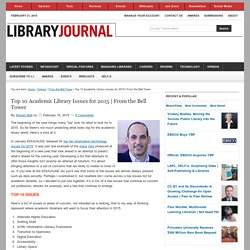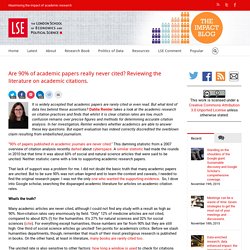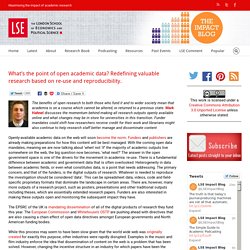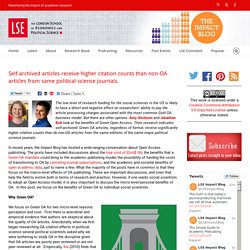

Viewcontent. Top 10 Academic Library Issues for 2015. The beginning of the year brings many “top” lists for what to look for in 2015.

So far there’s not much predicting what looks big for the academic library world. Here’s a shot at it. In January EDUCAUSE released its top ten information technology issues for 2015. It was just one example of the many lists produced at the beginning of a new year that look ahead in an attempt to predict what’s ahead for the coming year. Developing a list that attempts to offer those insights isn’t exactly an attempt at futurism. Top 10 Issues Here’s a list of issues or areas of concern, not intended as a ranking, that to my way of thinking represent where academic librarians will want to focus their attention in 2015: Alternate Higher EducationShifting StaffACRL Information Literacy FrameworkTransition to OpennessDigital EducationAccessibilityLibrary SpaceEbooksStudent DataLeadership Alternate Higher Education: Everyone is wondering what’s become of “The Year of the MOOC.”
Leadership: Why leadership? Are 90% of academic papers really never cited? Reviewing the literature on academic citations. It is widely accepted that academic papers are rarely cited or even read.

But what kind of data lies behind these assertions? Dahlia Remler takes a look at the academic research on citation practices and finds that whilst it is clear citation rates are low, much confusion remains over precise figures and methods for determining accurate citation analysis. In her investigation, Remler wonders whether academics are able to answer these key questions. But expert evaluation has indeed correctly discredited the overblown claim resulting from embellished journalism. “90% of papers published in academic journals are never cited.” That lack of support was a problem for me. What’s the truth? Many academic articles are never cited, although I could not find any study with a result as high as 90%.
Image credit: futureatlas.com (Wikimedia, CC BY) Clearly, academic articles have a serious problem. But my experience also showed what’s great about academic articles. And what about that 90% figure? Trajectory: Like a Rocket Booster for Book Metadata. What’s the point of open academic data? Redefining valuable research based on re-use and reproducibility. The benefits of open research to both those who fund it and to wider society mean that academia is on a course which cannot be altered, or returned to a previous state.

Mark Hahnel discusses the momentum behind making all research outputs openly available online and what changes may be in store for universities in this transition. Funder mandates could shift how researchers receive credit for their work and librarians might also continue to help research staff better manage and disseminate content Openly-available academic data on the web will soon become the norm. Funders and publishers are already making preparations for how this content will be best managed.
With the coming open data mandates, meaning we are now talking about ‘when’ not ‘if’ the majority of academic outputs live somewhere on the web, the big question now becomes, ‘what next?’ The EPSRC of the UK is mandating dissemination of all of the digital products of research they fund this year. Academics Librarians Institutions. Self-archived articles receive higher citation counts than non-OA articles from same political science journals. The low level of research funding for the social sciences in the US is likely to have a direct and negative effect on researchers’ ability to pay the article processing charges associated with the most common Gold OA business model.

But there are other options. Amy Atchison and Jonathan Bull look at the benefits of Green Open Access. Their research indicates self-archived/ Green OA articles, regardless of format, receive significantly higher citation counts than do non-OA articles from the same editions of the same major political science journals. In recent years, the Impact Blog has hosted a wide-ranging conversation about Open Access publishing. The posts have included discussions about the true cost of [Gold] OA, the benefits that a Green OA mandate could bring to the academic publishing model, the possibility of funding the costs of transitioning to OA by canceling journal subscriptions, and the academic and societal benefits of open academic data, just to name a few.